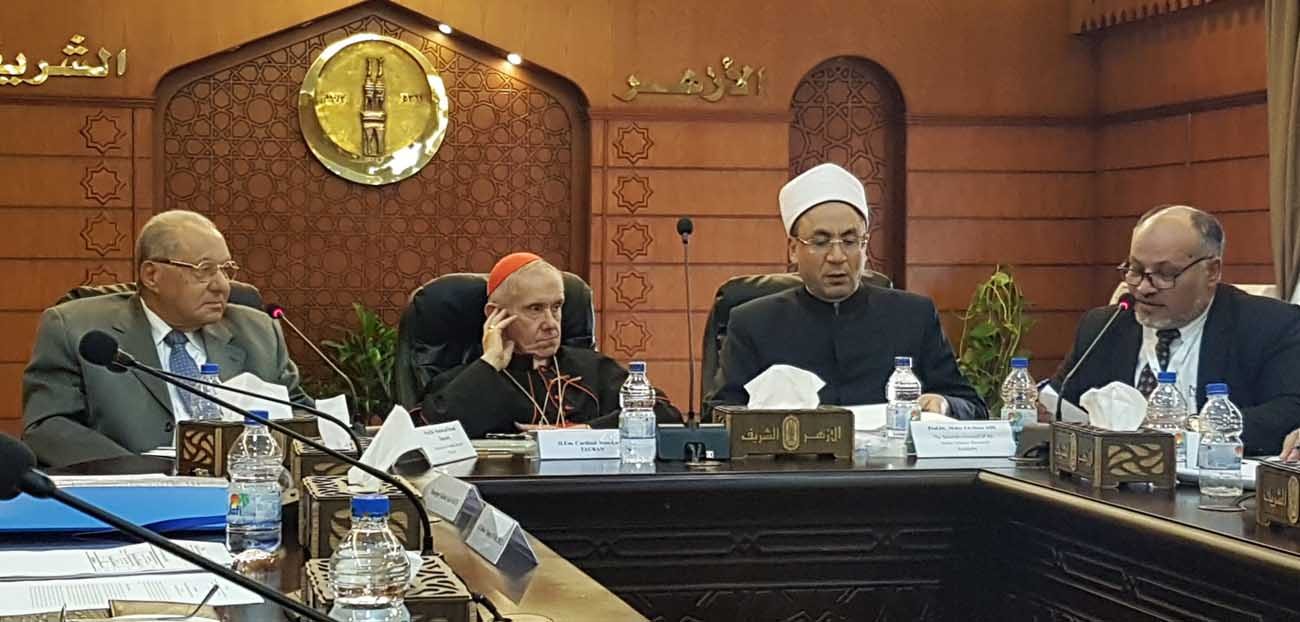CAIRO (CNS) — The Vatican and al-Azhar University, Sunni Islam’s leading institution of higher learning, called for the world’s governments, organizations and leaders to cooperate with each other in countering extremist and violent groups, noting that such groups “have negatively impacted stability and peaceful coexistence among peoples.”
In the final statement after a Feb. 22-23 symposium at the Cairo university, representatives of al-Azhar and the Vatican called for finding realistic ways to fight terrorism and terrorist organizations: cutting off resources, including money and weapons, or closing down social communications that spread extremist ideologies to young people.
They also called for eliminating the “spirit of hatred and animosity for religions and defaming religious symbols, since these are hostile actions.”
[hotblock]
The joint statement pointed to the need to address the “causes of the phenomena of extremism, violence, poverty, ignorance and the political abuse of religion and incorrect understanding of religious texts.”
Leaders must pay attention to issues that concern young people and open dialogue with them, explaining true concepts of religions. The statement advocated an educational curriculum “that establishes the common human values, taking into consideration women and youth issues and bearing the responsibility of caring for children.” It also stressed the need for mercy, love and for respecting “other official values” in countering extremism, violence and intolerance. It rejected “all forms of fanaticism, extremism and violence.”
The symposium concluded on the vigil of the anniversary of the visit of St. John Paul II to Al-Azhar in 2000.
Cardinal Jean-Louis Tauran, president of the Pontifical Council for Interreligious Dialogue, led the 15-member Vatican delegation. Gabriel Said Reynolds, a professor of Islamic studies and theology at the University of Notre Dame, Indiana, also was a member.
Another Vatican delegation member, Maronite Father Fadi Daou, chairman of Adyan, a foundation for interfaith studies and spiritual solidarity based in Lebanon, told the symposium that Pope Francis “is continuously affirming the double responsibility of all believers to delegitimize religious violence, on the one hand, and to engage in limiting its effect and build peace on the other hand.”
“As strongly stated by Pope Francis, every religion can and should be a source for peace and coexistence; yet any religion can be used for violence legitimization,” Father Daou added.
He emphasized that the consideration should not be which religion “is more peaceful than the other,” but rather, “how we can, together, make our world and life more peaceful by preventing the manipulation of religion.”
[hotblock2]
“Religions should be together, against violence and discrimination, but more efficiently to be together, too, for social justice, human rights, freedoms and especially freedom of religion and belief, inclusive citizenship and coexistence,” Father Daou said.
Organized by the Al-Azhar Al-Sharif Centre for Dialogue and the Pontifical Council for Interreligious Dialogue, the meeting represented a resumption in the dialogue established in 1998 between the two institutions. It also follows the landmark meeting at the Vatican May 23 between Pope Francis and the university’s grand imam, Ahmad el-Tayeb, the first meeting between a pontiff and a grand imam since the university suspended talks in 2011.
Al-Azhar-Vatican relations became strained in 2006 after now-retired Pope Benedict XVI gave a speech in Regensburg, Germany. Millions of Muslims around the world understood the speech to link Islam to violence.
PREVIOUS: Australian archbishops: Leadership on abuse was ‘catastrophic failure’
NEXT: Pope: Jesus guided by truth, mercy, not ‘one size fits all’ mentality




Given the Muslim and Nazi construct of Other, which I am sure even the Vatican, can deduce by simply picking up the Koran and Mein Kampf are exactly the same, will determine such a meeting as detailed in the article a wasted effort.